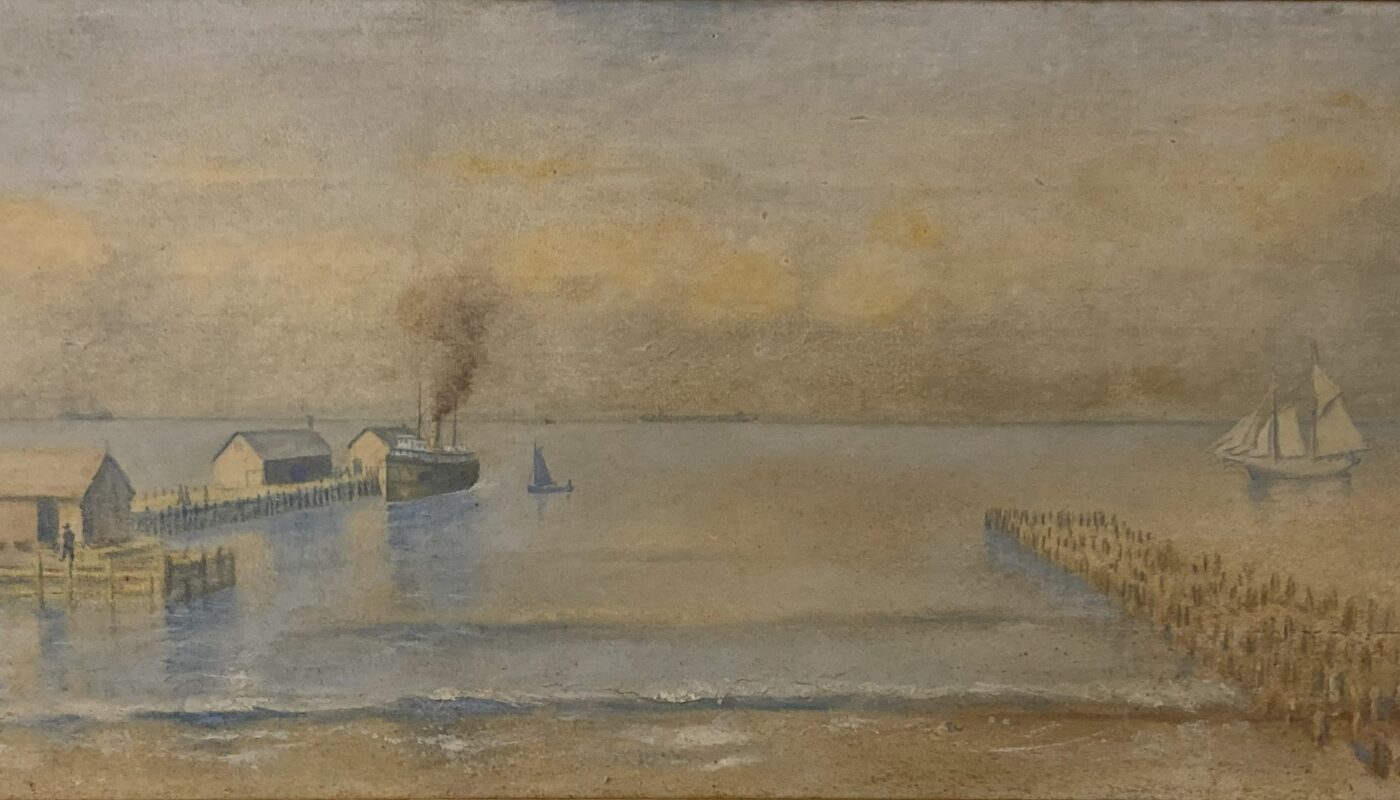I was doing some business at the Huron County Clerk and noticed a painting hanging in the hallway. I was a depiction of the R.L. Gillingham Fish Company in the late 1800s. The company is long gone, but it’s part of the Bay Port Historic Commercial Fishing District and listed in the National Register of Historic Places. Intreged, I did a bit of research, and here is a bit of background.
Table of Contents
Podcast Version – Bay Port and the Gillingham Fish Company: A Saginaw Bay Legacy
Commercial Fishing on Saginaw Bay
Bay Port – The Largest Freshwater Fishing Operation In the World
The Gillingham Fish Company, established in 1886 by Charles Gillingham, played a pivotal role in the development of Bay Port, Michigan, into one of the world’s largest freshwater commercial fishing ports during the early 20th century. Initially, the Gillingham family moved their operations from North Island to Bay Port, setting up their fishing enterprise on a man-made peninsula designed for efficient fish processing and shipping. (Wikipedia) (Michigan History Trail)
The Golden Years 1920-1930
The company quickly grew, leveraging the railroad’s arrival to ship large quantities of fish, such as perch, walleye, herring, whitefish, and carp, to major New York and Chicago markets. By the 1920s and 1930s, Bay Port had become renowned for its substantial fishing fleet and role in the national fish supply chain. (Wikipedia) (Michigan History Trail)
The Great Bay Port Fire of 1945
However, in 1945, a devastating fire destroyed most of the Gillingham Fish Company’s buildings. Under the leadership of Otto Schmidt, the company managed to rebuild some of its facilities and resume operations. Despite this, economic challenges led to the liquidation and restructuring of the company in 1949. Henry Engelhard and Mel Dutcher eventually acquired the business, with Engelhard becoming the sole owner by 1973. The company continued to operate under Engelhard’s leadership until he died in 1978, after which it was sold to the Williams family, who still run the Bay Port Fish Company today. (Wikipedia)
Bay Port Historic Commercial Fishing District
The Gillingham Fish Company and its contemporaries helped shape the commercial fishing industry in Michigan, contributing significantly to the region’s economic and cultural history. The legacy of these fishing operations is preserved in the Bay Port Historic Commercial Fishing District, which stands as a reminder of the area’s rich maritime heritage. (Wikipedia)
Use of Charity Islands by R. L. Gillingham Fish Company
The Gillingham Fish Company played a significant role in the fisheries history of the Big and Little Charity Islands. In the 1800s, the company leased fishing rights from the federal government. In 1925, the company eventually purchased most of Big Charity Island, excluding the lighthouse tower. This acquisition marked a pivotal expansion in their operations.
The company established fishing huts on the island’s south end and constructed a crib wall offshore to protect their boats, remnants of which can still be seen from aerial views today. Big and Little Charity Islands hosted crews and ships throughout the fishing season, with Little Charity Island housing two buildings that stored nets, wooden barrels, and salt.
The fish caught were salted and packed in barrels on the islands before being transported by tender boats to Bay Port, Michigan. From there, the fish were shipped as far as New York and the mining communities in Tennessee and Kentucky, providing a crucial source of protein thanks to the preservation method that negated the need for refrigeration. (Great Lakes Fisheries Hertiage Trail)
Who was Robert L. Gillingham?
Robert L. Gillingham (1903-1988) was a notable businessman and community figure in Caseville, Michigan. A descendant of a family deeply entrenched in the commercial fishing industry, Robert and his brother John managed the Gillingham Fish Company of Bay Port, continuing a legacy that dated back to before the Civil War. The family’s fleet, at its peak, consisted of over 20 vessels that shipped fish from Saginaw and Wildfowl Bay to major markets like New York, Boston, and Chicago.
In addition to his work in commercial fishing, Robert Gillingham owned the North Island Fish Company of Caseville and R. L. Gillingham Real Estate. His entrepreneurial spirit extended beyond fishing and real estate; he served as the past president of the Peoples Oil and Gas Company of Pigeon. Gillingham was also active in promoting tourism in Michigan’s Thumb region, serving as president of the East Michigan Tourist Association in 1943.
Gillingham’s contributions weren’t limited to business. He was an accomplished violinist passionate about collecting and lending handmade instruments to students nationwide. His community involvement included membership in Free and Accepted Masons (F&AM) and the Fraternal Order of Eagles (FOE). A graduate of the University of Michigan Law School in 1929, he was admitted to the State Bar of Michigan the same year.
Despite the fishing industry’s decline due to factors like fires and the depletion of fish populations, Robert Gillingham’s legacy in Caseville and the broader Thumb region remains significant. His efforts in business, community service, and cultural contributions highlight a life dedicated to the betterment of his community. He passed away in 1988, leaving a family that continued his dedication to the area.
For more detailed historical insights, you can explore resources from the Michigan History Trail and the Bay Port Historic Commercial Fishing District.
Video: History of Michigan’s Largest Commercial Fishery
Final Thoughts About The Gillingham Fish Company
The Gillingham Fish Company has a rich and storied history deeply intertwined with Bay Port, Michigan’s development, and the broader commercial fishing industry on the Great Lakes. Established in 1886 by Charles Gillingham, the company quickly became a major player in the region, leveraging the railroad’s arrival to distribute its catch to markets across the eastern United States. Despite facing significant challenges, including a devastating fire in 1945 and the economic decline of the fishing industry, the company persisted through strategic restructuring and leadership changes, continuing to contribute to the local economy and cultural heritage.
